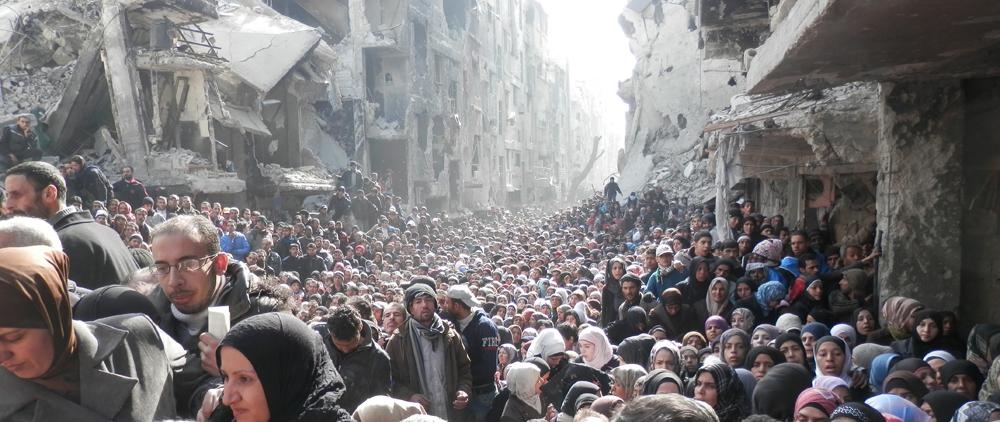UN aid workers gained access to Palestinian refugees in the Damascus area for the first time in over seven months following approval by the Syrian government to open a limited number of besieged areas across the war-torn country. Chris Gunness, spokesperson for the UN agency for Palestinian refugees (UNWRA) told Ma’an that workers were able to deliver aid to besieged and hard-to-reach communities in the Damascus area for the fifth consecutive day on Wednesday.
It was the first time since June of last year that UN aid workers were able to reach Palestinians in the neighborhood of Yalda, as well as Babila and Beit Saham which lie near the Yarmouk refugee camp in the Syrian capital. Gunness told Ma’an that UNRWA was able to deliver aid to 6,000 families by Wednesday, adding that the aid agency hopes to deliver blankets in the coming days as freezing temperatures continue.
“Palestinian residents of Yarmouk refugee camp who traveled to the neighborhood of Yalda in order to receive aid said that the situation in the camp was “beyond inhumane,” Gunness said.
UN Special Envoy Staffan de Mistura was reportedly given approval to access seven besieged areas across Syria on Tuesday following crisis talks with Syria’s Foreign Minister Walid al-Muallem.
While Gunness said the go-ahead has enabled crucial access, he added that aid workers have not been able to access the Yarmouk camp itself since March 28.
“Yarmouk was already a community where women were dying during childbirth and children were eating grass,” Gunness said, expressing grave concern for how conditions in the camp may have degraded since.
The around 450,000 Palestinian refugees estimated to remain in Syria are among the millions of Syrians to come under repeated attacks and sieges since fighting began five years ago.
The majority of Yarmouk’s 180,000 residents fled amid a government siege of the camp that began in 2013, as well as fighting between the government forces and armed opposition groups.
After the Islamic State group gained control of Yarmouk on April 1, UN Secretary-General Ban Ki-Moon referred to the Palestinian refugee camp as the “deepest circle of hell” in Syria’s ongoing conflict, resembling a “death camp” for its remaining 18,000 residents.
Over 100,000 Palestinians have been among the over four million people to flee Syria.
Many of those who fled have attempted to cross to Europe by both land and sea, as well as to neighboring countries, despite the denial of rights granted to other refugees that decrease chances for Palestinian refugees to gain access into other countries.
[Source: Ma’an News agency]





 WhatsApp us
WhatsApp us 


2 comments
sadly its always the peaceful majority who suffers most,
the palestinian refugees in syria and jordan were treated the best compared with all other arab states…
sadly its leadership including hamas sucking up the "the alliance" of usa nato eu turkey saudi gulf states etc thought the grass was greener with the result that most of the takfiri scum of isis are from the palestinian grouping,
…..dirty politics always have greater negative effects on the oppressed…
I dont think that their is any independent and verifyable evidence in terms of a clear and vetted number count to suggest that ISIS is composed predominantly of nationals from any state. On the contrary some say that it is mainly Iraqi’s, others say it is mainly algerians, other say it is mainly Tunisians, and others say it is mainly Saudis. Some-how having many Saudis involved makes more sense because of their Wahabist ideology. Undoubtedly, there would be a contingent of people from any state being fooled to join for whatever reason. But I agree, sadly its always the people in the middle who suffer the brunt of geopolitical games.